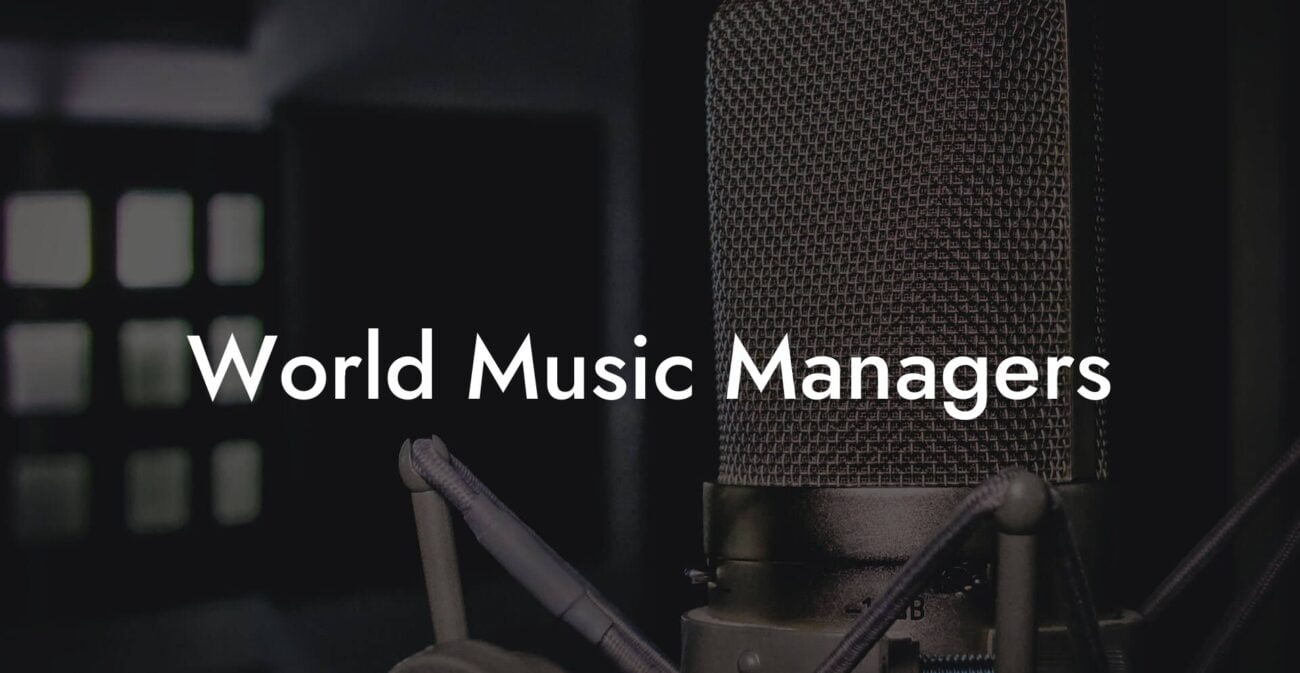If you’ve ever wondered whether your music manager is mythically eating 50% of your royalties or just nibbling a modest slice of the pie, you’re in the right place. In today’s wild, ever-evolving music industry—where every tune has the potential to go viral overnight and every beat could be the next big hit—we’re breaking down the real scoop on what percent music managers actually get. Prepare to dive into a no-nonsense, refreshingly candid look at the commission percentages you might encounter, why those percentages matter, and how you can navigate the twists and turns of the music business with a healthy dose of humor and savvy.
Looking to write your next song? Transform your creative ideas into songs that people will love, and skyrocket your music career with Lyric Assistant. The perfect songwriting assistant. Find out more →
Quick Links to Useful Sections
- Understanding the Role of Music Managers in Today’s Music Industry
- Breaking Down the Percentage: How Much Do Music Managers Get?
- The Evolution of Music Manager Fees in the Digital Age
- Negotiating Your Music Manager Contract: Tips for Emerging Artists
- Do Your Homework
- Know Your Value
- Clarify the Services Provided
- Discuss Duration and Exit Clauses
- Bring in a Professional
- The Value Beyond the Percentage: What Your Music Manager Brings to the Table
- Music Management Contracts: What to Expect and Which Red Flags to Watch Out For
- Key Components of a Music Manager Contract
- How Music Managers Help Elevate Your Songwriting and Artistic Vision
- Case Studies: When the Percentage is Just the Tip of the Iceberg
- Case Study 1: The Indie Sensation Who Broke the Mold
- Case Study 2: The Viral Star Who Leveraged Digital Platforms
- Case Study 3: The Songwriting Prodigy Transitioning to Stardom
- Legal Considerations and the Fine Print: What Every Musician Should Know
- Charting Your Musical Future: The Digital Era and Beyond
- Resources and Community Support: Your Next Steps
- Frequently Asked Questions About Music Manager Percentages
- Your Path Forward: Embracing the Manager-Artist Partnership
Understanding the Role of Music Managers in Today’s Music Industry
Think of your music manager as your backstage pass to the intricate world of showbiz. They’re part strategist, part project manager, and part personal cheerleader—helping you balance the creative chaos of songwriting with the business savvy needed to succeed. From negotiating record deals to planning tours, and even huddling with industry execs in smoky boardroom meetings (okay, maybe not that smoky), your manager is out there hustling on your behalf.
But here’s the kicker: while we often sing the praises of what managers do, many up-and-coming musicians and Gen Z songwriters remain in the dark about exactly how they’re compensated for their hard work. Spoiler alert: it’s not as mysterious as a hidden track on your favorite album, but it does involve a percentage cut that might make you do a double-take.
At its core, a music manager’s commission is their reward for taking on the heavy lifting of breaking into a competitive industry. They invest time, effort, and sometimes even personal money to help polish your talent into something that can truly resonate with audiences and generate revenue. But how do you ensure that you’re not giving away too much of your hard-earned money in the process? Let’s dig deeper into the numbers.
Breaking Down the Percentage: How Much Do Music Managers Get?
The million-dollar—or should we say, chart-topping—question remains: what percent do music managers get? Historically speaking, industry norms have hovered between 15% to 20% of an artist’s earnings. This percentage typically applies to several revenue streams, including but not limited to:
- Live performance fees and gig revenue
- Music sales and streaming royalties
- Merchandising and branding opportunities
- Synchronization deals (think movies, TV shows, and commercials)
While the 15% to 20% range is a classic benchmark, it’s important to note that no two deals are identical. Some managers might start off with a lower percentage as they build a relationship with you, and then adjust their fee once your career gets a bit more rock ‘n’ roll. Others might negotiate different terms based on the specific services they offer.
In rare cases, you might encounter agreements where the commission is even higher, especially if the manager is shouldering hefty upfront costs or providing a comprehensive suite of services. On the flip side, if you have an established fanbase and strong industry clout, you might negotiate a lower percentage because you’re not relying solely on your manager to snag those record deals.
Here’s the real tea: while percentages provide a useful guideline, the true value of a music manager lies in how they can amplify your creativity, connect you with opportunities, and ultimately help you build a sustainable career. So while numbers are important, never underestimate the power of a good manager who believes in your talent as much as you do.
The Evolution of Music Manager Fees in the Digital Age
Remember the days when your biggest worry was whether your mixtape had the right track order? Welcome to the digital age, where streaming algorithms, viral TikTok challenges, and Instagram influencer collabs play a massive role in your career. With these changes come shifts in how music managers earn their keep.
Back in the analogue days, musicians depended heavily on physical sales, radio play, and conventional tours for income. Today, revenue streams are diversified and decentralized, leading to fresh challenges—and opportunities—in defining compensation models. As streaming becomes the norm, managers now must navigate complex licensing deals, negotiate digital rights, and harness the power of social media to pivot their strategies.
This evolution has also sparked conversations about fairness and transparency. With more avenues for income, some argue that a flat percentage may not capture the value of different revenue streams accurately. In response, a handful of managers are exploring hybrid models, such as lower base percentages with performance bonuses or tiered rates that change as your income grows. It’s the classic case of “you gotta spend money to make money,” and in the digital game, every percent counts.
Ultimately, whether you’re dropping an EP on SoundCloud or planning an international tour, understanding the evolution of manager fees empowers you to make informed decisions about your career path. Knowledge is power (and a little bit of negotiation savvy never hurt either).
Negotiating Your Music Manager Contract: Tips for Emerging Artists
Let’s face it: negotiating a music manager contract can feel as nerve-racking as performing live in front of thousands (and yes, we’re talking sweaty palms and butterflies galore). That said, you’re not alone, and knowing what to look for in your contract can give you the upper hand.
Here are some essential tips to help you navigate the negotiation process:
Do Your Homework
Understand the industry standards. As we mentioned earlier, a standard manager commission typically falls in the 15% to 20% range, but there’s flexibility. Research recent deals and speak with fellow emerging artists to get a realistic picture.
Know Your Value
Remember, you’re not just a creative force; you’re a burgeoning business. If you’ve already built a dedicated following or have a portfolio of successful releases, leverage that power. A proven track record can enable you to negotiate for a lower percentage or more favorable contractual terms.
Clarify the Services Provided
Is your manager handling solely career development, or do they also manage booking, public relations, and merchandising deals? Be clear about what services are included in the percentage. Sometimes, a higher percentage might be justified if your manager is offering a full suite of services beyond the basics.
Discuss Duration and Exit Clauses
Contracts should have a predetermined duration, after which you can renegotiate terms based on your career progress. Ensure there are clear exit clauses in case the relationship isn’t working out as planned—after all, both parties should be able to pivot as circumstances change.
Bring in a Professional
Hiring an entertainment lawyer or a seasoned industry consultant can illuminate potential pitfalls in your contract. They’ll help decode the legal jargon and ensure that you’re not signing away too much of your future earnings.
By arming yourself with knowledge and a clear understanding of what’s standard in the industry, you can enter negotiations with confidence and score a deal that allows you to thrive creatively and financially.
The Value Beyond the Percentage: What Your Music Manager Brings to the Table
While the percentage a manager takes is a crucial component of the business equation, it’s only one piece of the puzzle. Consider all the sweat, hustle, and street-smarts a good manager brings to the table. They’re often the unsung heroes behind every viral hit and chart-topping album.
Here are a few ways to unpack the value beyond just the raw numbers:
- Industry Connections: A well-connected manager opens doors to record labels, renowned producers, and collaboration opportunities that you might not access on your own.
- Brand Building: Your manager works tirelessly to craft and polish your image—transforming your artistic vision into a marketable brand that resonates with audiences online and offline.
- Strategic Planning: From booking gigs to planning album releases, your manager designs a roadmap for your career that aligns with current industry trends and your personal goals.
- Crisis Management: When the music business throws a curveball (and trust us, it does), your manager navigates the chaos, handling everything from PR mishaps to sudden contract disputes.
- Negotiation Expertise: Beyond just securing you gigs or deals, a savvy manager negotiates terms that protect your interests and ensure a fair distribution of revenue.
So, while that 15% to 20% commission might seem like a lot at first glance, it’s important to view it as an investment in your career. In many cases, the benefits of having a proactive, well-connected manager far outweigh the percentage taken.
When you partner with someone who truly understands both your creative identity and the business of music, you’re setting the stage for a career that’s as sustainable as it is sensational.
Music Management Contracts: What to Expect and Which Red Flags to Watch Out For
Let’s be real—contracts can be as perplexing as the rules of TikTok trends, but they’re a necessary evil when it comes to protecting your interests. Music management contracts outline everything from commission rates to the scope of services provided, and they serve as a roadmap for your future success.
Here’s a quick guide on what to expect when you’re signing on the dotted line:
Key Components of a Music Manager Contract
- Commission Rate and Payment Structure: Clearly states the percentage of earnings your manager will take, along with details on what revenue streams are included.
- Duration of the Agreement: Specifies the term of the contract, along with conditions for renewal or termination.
- Scope of Services: Outlines exactly what your manager is responsible for—whether it’s booking shows, handling public relations, or managing digital content.
- Advance Fees and Recoupable Expenses: Details any upfront investments the manager makes and whether those costs are deducted from your future earnings.
- Exclusivity: Defines whether the manager is your sole representative, and under what conditions you might work with additional agents or managers.
Red Flags to Watch For:
- If the contract is overly vague about the scope of services, it might leave you without a clear idea of what you’re paying for.
- Beware of clauses that lock you in for an unreasonably long term without an exit strategy.
- Avoid agreements that grant your manager rights to unexplained portions of ancillary revenue streams.
- Be cautious if any fees or deductions aren’t clearly itemized—transparency is key.
Even if the topic of percentages seems like dry business talk, understanding these elements is paramount. A well-structured contract not only protects your creative rights but also cements a mutually beneficial relationship between you and your manager.
How Music Managers Help Elevate Your Songwriting and Artistic Vision
Let’s shift gears for a minute and focus on why, despite the inevitable percentage cuts, having a music manager can be a total game-changer for your career. As a songwriter or independent artist, your passion lies in creating and sharing your art. A solid manager not only handles the nitty-gritty of the business side but also helps bring your artistic vision into sharper focus.
Here’s how a music manager can elevate your journey:
- Tailored Career Strategy: With a thorough understanding of your goals and style, your manager crafts a strategy that aligns with your artistic identity, ensuring that each move is a step toward long-term success.
- Industry Mentorship: Learn the ropes from someone who’s been in the trenches. Whether it’s feedback on your lyrics or advice on navigating contracts, a seasoned manager offers insights that transform your approach to the craft.
- Networking Opportunities: From collaborations with other artists to introductions to producers and distributors, a good manager’s contacts can open doors you didn’t even know existed.
- Time Management: Free up more time to focus on what you love—writing songs, recording in the studio, and connecting with fans—while your manager handles the scheduling, negotiations, and business logistics.
- Creative Collaborations: Often, managers can suggest new creative directions or opportunities that align with emerging trends, helping you stay ahead of the curve and resonate with an ever-changing audience.
By taking on the challenging, behind-the-scenes work, a music manager lets you channel your energy into your craft and grow as an artist. Whether you’re dreaming of headlining festivals or going viral on social media, the right manager not only secures the deals but also amplifies your distinctive voice.
Case Studies: When the Percentage is Just the Tip of the Iceberg
Let’s get real with some success stories—because nothing spells inspiration like proof that a well-thought-out manager-artist relationship can transform dreams into platinum records.
Case Study 1: The Indie Sensation Who Broke the Mold
Meet Alex, an emerging indie artist whose quirky lyrics and do-it-yourself aesthetics caught the attention of a visionary music manager. Initially, Alex was skeptical about signing a contract with a 20% commission, fearing loss of creative control. However, within a year, that manager’s strategic planning and industry insights landed Alex collaborations with boutique labels, secured gig slots at renowned indie festivals, and boosted streams across platforms. Alex’s story is a testament to the fact that sometimes, a higher percentage can lead to exponential growth.
Case Study 2: The Viral Star Who Leveraged Digital Platforms
Then there’s Jamie, a TikTok sensation known for catchy hooks and viral dance challenges. Jamie’s manager was adept at leveraging digital platforms to secure sponsorship deals and negotiate smart licensing agreements. With a manager taking a 15% commission, Jamie’s online presence skyrocketed, leading to multi-million streaming numbers and lucrative brand partnerships. The case of Jamie exemplifies how savvy management in the digital age can create a win-win scenario, where both the artist and the manager thrive.
Case Study 3: The Songwriting Prodigy Transitioning to Stardom
Consider Taylor, a gifted songwriter juggling multiple offers from record labels and film studios. With a passionate manager in their corner, Taylor was able to negotiate a contract that combined a standard commission rate with performance incentives—resulting in both creative freedom and financial rewards that exceeded initial expectations. Taylor’s journey underscores the importance of flexibility and the value of a manager who is willing to tailor a deal as unique as the artist.
These case studies illustrate that while the manager’s percentage is important, the real magic lies in the support, guidance, and connectivity they bring to the table. It’s not just about sharing the revenue—it’s about building a legacy.
Legal Considerations and the Fine Print: What Every Musician Should Know
While percentages, success stories, and negotiation skills form the backbone of music management, no discussion is complete without a nod to the legal aspects. After all, every song has its rights—and so do you. Understanding your rights as an artist and the legal nuances of a management contract is crucial for long-term success.
When you’re sifting through the legal fine print, keep these pointers in mind:
- Clarity of Terms: Ensure that every clause—from commission rates to termination conditions—is written in plain language. Ambiguities can lead to disputes later on.
- Intellectual Property Rights: Retain ownership of your music. Your manager should help you secure and protect your copyrights rather than claim any undue stake in your creative work.
- Conflict of Interest: Be wary of contracts that restrict you from working with other professionals or that grant your manager additional roles that could lead to conflicts of interest.
- Regular Reviews: As your career evolves, so should your contracts. Always consider having periodic reviews with legal counsel to ensure your agreement remains fair and beneficial.
- Transparency in Expenses: If your manager is fronting expenses, understand exactly how those amounts will be recouped from your earnings.
By staying informed and working with trusted legal advisors, you ensure that your partnership with your manager is built on a foundation that respects your creativity and protects your future.
Charting Your Musical Future: The Digital Era and Beyond
As we head further into the digital era, the landscape of the music industry continues to morph at breakneck speed. The roles, revenue models, and expectations are constantly in flux, and with this evolution comes the need for fresh business strategies. For emerging artists, this means that understanding manager percentages and contract nuances is more crucial than ever.
Digital platforms have democratized music distribution, allowing independent artists to reach global audiences with a few clicks. However, with opportunity comes challenge—navigating subtleties like digital rights management, multiple income streams, and the balancing act of social media can be as complex as composing a chart-topping hook.
In response to these challenges, managers are adapting, too. They’re harnessing data analytics, streaming metrics, and digital engagement tools to fine-tune your path to success. The traditional 15% to 20% model is now being reimagined through performance-based incentives, hybrid revenue shares, and flexible contracts designed to reward mutual growth.
For artists who want to build a sustainable career in this ever-shifting digital ecosystem, partnering with an adaptable, insightful manager isn’t just a luxury—it’s a necessity. Knowledge, preparation, and open communication are your best tools for ensuring that your manager not only takes a fair percentage but also delivers real value to every beat of your career.
Resources and Community Support: Your Next Steps
Navigating the world of music management might seem daunting, but you’re not alone in this journey. Whether you’re an emerging songwriter or an aspiring musician eager to make waves in the industry, there are myriad resources and communities dedicated to helping you succeed.
At Lyric Assistant, we’re all about empowering artists like you. Our platform is designed to help you effortlessly write lyrics for your next hit, while our blog and community discussions offer insights into everything from songwriting to savvy contract negotiation. Here are a few more ways you can get started:
- Industry Podcasts and Webinars: Tune into discussions featuring successful artists, managers, and legal experts who share insider tips on making the most of your music career.
- Networking Events and Workshops: Attend local meetups, online conferences, and music festivals where you can connect with managers, other artists, and industry professionals.
- Educational Resources: Dive into online courses and tutorials that break down contract basics, negotiation tactics, and digital marketing strategies for musicians.
- Community Forums: Join social media groups and forums where up-and-coming musicians share personal experiences, contract tips, and support one another as they navigate the complexities of the industry.
- Personalized Mentorship: Seek out a mentor or industry veteran who can offer guidance tailored to your specific career stage and artistic vision.
By taking proactive steps to educate yourself and engage with the music community, you’re not only enhancing your creative skills but also positioning yourself strategically for long-term success. Remember, every hit song and every successful tour begins with you taking the initiative.
Frequently Asked Questions About Music Manager Percentages
We know you’ve got questions—and we’re here with some of the most common ones answered. Check out the FAQs below to clear up any lingering doubts about music manager percentages and contracts.
1. What is the typical commission percentage for music managers?
Most music managers charge between 15% and 20% of an artist’s earnings from various revenue streams. However, this figure can vary based on the level of services provided and the artist’s career stage.
2. Are there situations where the commission might be different?
Yes, absolutely! Some agreements include performance incentives, hybrid commission models, or varying rates depending on the revenue source. The specifics should be clearly outlined in your contract.
3. Can I negotiate the percentage in my management contract?
Definitely. Many artists negotiate for lower commission rates or more flexible terms, especially if they have an established fanbase or multiple income streams.
4. How does a manager’s percentage differ for digital revenue versus live performance fees?
The percentage could vary based on the type of revenue. While a standard figure is often applied across revenue streams, some contracts specify different percentages for digital streams, merchandising, and live performances.
5. What should I look for in a music management contract besides the percentage?
Ensure the contract clearly details the scope of services, duration, termination clauses, expense recoupment, and intellectual property rights. Greater transparency here protects your art and career.
6. How can a manager add value beyond just securing deals?
A committed manager boosts your career by offering industry contacts, strategic planning, crisis management, and creative collaboration—all of which help maximize your potential far beyond what a simple percentage might suggest.
The key is to see your manager not just as a cost, but as a valuable partner in your journey toward musical success.
Your Path Forward: Embracing the Manager-Artist Partnership
As you step into the spotlight of the music world, understanding the dynamics of manager commissions and contracts becomes an essential part of carving your unique path to stardom. The percentage your manager takes is just one piece of a larger partnership that can propel your career to dazzling new heights.
Whether you’re an independent artist honing your sound with tools like Lyric Assistant, or an emerging hit-maker setting the stage for a breakthrough moment, make sure you invest time in understanding every facet of your business arrangement. Embrace transparency, nurture open communication, and take pride in the professional relationships that will ultimately define your career.
Remember, every percentage point symbolizes not only money but also the commitment of your manager to champion your success. With the right partnership, strategic negotiations, and a clear vision, you’re not just signing a contract—you’re investing in your future as a musical trailblazer.
The journey ahead is as challenging as it is exhilarating, and armed with this knowledge, you’re better equipped than ever to negotiate deals that honor your talent, protect your rights, and celebrate your creative spirit. So go ahead—dive into the intricacies of management agreements, be a savvy negotiator, and let your music resonate far and wide, all while keeping a watchful eye on that commission percentage.
Your musical journey is uniquely yours—filled with growth, triumphs, and countless opportunities to refine your craft. With the right team by your side, including a dedicated manager who aligns with your vision, there’s no limit to what you can achieve in the fast-paced, ever-changing realm of music today.














